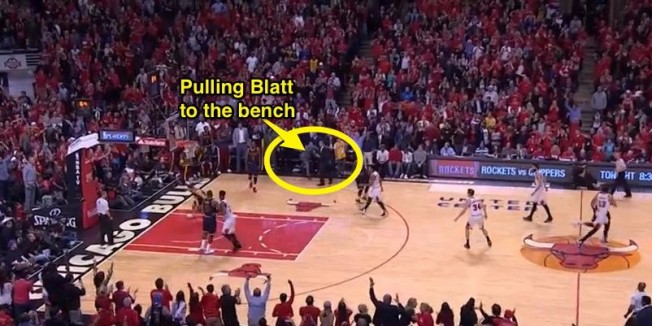First things first: Tyronn Lue — no matter what else is going to be said in the next several paragraphs — already made a significant contribution to the Cleveland Cavaliers.
Nothing about the historical record will ever change that fact, either.
Remember this incident?
Lue pulled David Blatt to the bench in an attempt to prevent the Cleveland Cavaliers’ head coach from being recognized by the officials for a timeout call. The Cavs had no timeouts left at the end of Game 4 of the Eastern Conference semifinals against the Chicago Bulls. The score was tied with 9.4 seconds left, so if the officials had recognized Blatt’s timeout, Cleveland would have been hit with a technical foul. The Bulls could have taken a one-point lead. Sure, the Cavs still would have had the ball and a chance to win, but a miss would not have meant overtime. It would have meant a 3-1 deficit in the series.
Lue’s simple act of restraining Blatt — who fully revealed in that moment what many in the Cavs organization have been speaking about over the past few days — helped ensure that Cleveland returned to the NBA Finals for the first time since 2007. A failure to make the NBA Finals, or even the East finals, would have gotten Blatt fired on the spot. In this way, Lue stepped into the breach and helped the man he was paid to help.
Yet, Lue’s excellence as an assistant coach — he truly assisted Blatt in that moment of importance — hasn’t seemed to extend very far.
Lue was there for his team and his coach in Game 4 against Chicago, but one has to wonder where he’s been at other times.
It was quite striking to hear Lue say — after his debut game as a head coach Saturday night — that his team was out of shape, unprepared to run the faster-tempo offense he wants in Cleveland. Perhaps Lue’s remarks weren’t entirely accurate, but we all know that coaches should pick their spots in terms of what they do and don’t say in public. Beyond that, however, a more basic reality remains:
Isn’t it the job of professional athletes to be in shape?
This invites an important follow-up: Much as there are strength and conditioning coaches in college sports, professional organizations are dedicated to helping their players train, eat, rest, rehabilitate from injury, and practice to the best of their ability, such that they’re able to perform at an ideal level when the lights go on.
The follow-up questions are obvious:
1) Don’t the Cavs have a support staff which should get players in shape?
2) Doesn’t a support staff help athletes in a way which is not inherently dependent on what the head coach says or does? Consultation and coordination would surely exist, but if the feeding and care of athletes requires various steps from a training-based or sports-medicine standpoint, doesn’t the support staff get to shape that plan with the player, while the head coach takes second place in that process?
3) As one of the highest-paid assistant coaches in the NBA, didn’t Tyronn Lue have the ability to help his players pursue a regimen of training and conditioning which would put them in position to function effectively on the court?
4) As one of the highest-paid assistant coaches in the NBA, and as the man the Cavaliers’ roster supposedly respected all while rebelling against Blatt’s perceived incompetence, why did Lue not work with LeBron James (at the very least) to make sure Saturday’s postgame statement would never have to be uttered?
Two more follow-up questions emerge on an even broader level, beyond the question of whether the Cavs are in good physical condition at the present time:
5) If the culture in the Cavs’ locker room was that bad, what was Lue really doing to make it better?
6) If Lue was the one running the team all along (perhaps, maybe even likely, in concert with LeBron), just exactly why should it be seen (or felt) that the Cavs needed a change in culture? Wasn’t this makeup the culture itself?
All these questions try to magnify — and make you think about — a larger reality: While the head coach is a central presence in a locker room and on the bench on gamenights, meaning that it can make a difference whether Person X is wielding influence as an assistant or as the man in charge, it remains that a coaching staff is just that — a staff. Even if the head coach might be flawed, a number of voices exist in the room.
Blatt, as a veteran coach in the Euroleague, needed a strong assistant coach who would serve as his guide and portal to the NBA way of doing things. Lue took on this role and was accordingly paid an at an appropriately high rate. Blatt, far more than most NBA head coaches, occupied a relatively weak seat of power within his organization and its dynamics. He was the inverse of Gregg Popovich or Doc Rivers, someone with extensive organizational control and influence.
Lue, as the yin to Blatt’s yang, was one of the stronger and more empowered assistant coaches in the league. If Blatt was weaker, Lue functioned more as an associate head coach than many assistants. His power within the Cavs’ structure was more substantial, given Blatt’s lack of NBA coaching experience and his need to handle LeBron James, a player he wasn’t asked to coach at the time he was hired in Cleveland.
Again, then, in light of this larger context: Just exactly where was Tyronn Lue these past 1.5 seasons (Game 4 against Chicago excepted) to influence the culture in the Cavs’ locker room? If that culture was so broken up to now, why is Lue being chosen — and expected — to fix it?
Such is the aftermath of the move which will be dissected for the remainder of this season.


